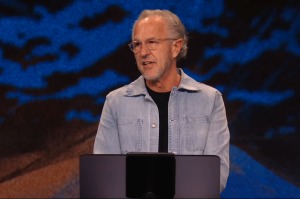Interview: Author on How American Christianity Really Looks
The church is shrinking; Christians get divorced more than anyone else; non-Christians have a very low opinion of Christians.
That's the bad news many people hear when it comes to Christianity in the United States. And a lot of it is lies, says sociologist Bradley R. E. Wright, of Storrs, Conn.
Wright presents an analysis of previous research in his new book, Christians Are Hate-Filled Hypocrites … and Other Lies You've Been Told, to offer readers a more accurate view of American Christianity.
He acknowledges that it'll be difficult to change popular beliefs about Christianity and Christians even with more accurate data and he expects to continue to hear overly negative portrayals of American Christianity both within the media and in churches. Still, he wants to present the data and let the data speak for themselves.
CP: How long have you been studying American Christianity?
Wright: Only for about four years now. Before that I studied crime and homelessness.
CP: So what got you interested in studying Christianity?
Wright: I've always had an interest in studying Christianity. I'm a Christian myself. Once I received tenure, that made it a lot harder to fire me and so I took a year off to sort of reorient my research to something I found more sort of compelling. I wanted to work more merging my faith and my profession.
CP: Did you grow up a Christian?
Wright: I grew up in the Catholic Church. My mom and my sister were devout Catholics for whom the presence of Jesus Christ was quite a reality. For whatever reason it didn't catch with me. And so I had a born-again experience in high school in a Campus Life group. And since then I've been involved with evangelical churches. I spent several years at a Vineyard charismatic church. My wife and I went to an Episcopalian church about seven, eight years. Now we're back to an evangelical community church.
CP: So you're not really loyal to a certain grouping of Christians, but you're just looking for the right community of believers?
Wright: Yeah, that would be one way to put it.
CP: You say you started writing the book after you began blogging. What did you blog about?
Wright: That's the nice thing about blogging is you get to write whatever you want. On my blog, everything from pictures of flowers I've taken to in-depth statistical treatment. But in terms of what's related to this book, I just started blogging about statistics I found about Christianity and one set of those statistics have to do with the divorce rate. We're all familiar with the idea that Christians have divorce rates as high, if not higher, than non-Christians. I heard that for years but as I thought about it, it just didn't make sense. You know my wife and I have received so much support from our pastors, from members in small group, from the church as a whole that I just didn't see how that couldn't make a difference. So I started to look into it and I did analyses on five different data sets and they all said the same thing, that Christians actually have lower divorce rates. And I put this on my blog – a 12 or 14 part series – and I got a lot of feedback and a lot of notice. [People] found that gratifying to sort of bust that myth as it were.
CP: So it was the divorce statistic that got you started on this whole journey.
Wright: Exactly.
CP: When did you start blogging?
Wright: I think it was November 2006.
CP: So you mention that it was both the media and Christians that were spreading this misinformation. Would you place the responsibility more on one of those groups?
Wright: I would say it comes from both but maybe just in different ways.
CP: You mention Christian speakers who are really misinforming their audiences with statistics like youth leaving the church. Do you feel they're doing that because they feel the culture they're in – the postmodernism, the pluralism – is maybe worse than possibly the liberalism from decades ago?
Wright: The short answer is I don't know. But I can give you my speculations. And to be clear, I'm not picking on these people. My sense is that they're using these statistics with the best intentions, that their goal is to try to save the church from what they perceive to be a terrible problem and imminent disaster. The expression I use is "scary statistics are useful," that it helps us to create audiences and create a need for our message.
What you're asking more specifically is why do they so readily believe these scary statistics. One answer might be that they're just very useful for their ministries. Another, especially regarding youth, is throughout history old people have worried about young people's morals. There's a funny quotation in the book from an Assyrian tablet from hundreds of years before Christ where it complains about the young people of the day and how they're not following what the old people say.
CP: Do you feel Christians are maybe too apathetic and maybe they need a little kick to try to get more involved in the church like in outreach?
Wright: I think that might be part of the motivation. If I were to speculate, pastors and leaders and book writers and conference speakers want the church to do even better, to reach out more, to give more, to pray more, to read the Bible more, to do everything more. Now what I would like them to say, "well, I've looked at the data and you guys are going pretty well but let's do even better." But that may not be a compelling enough message, that may not sell books or conference tickets so what it ends up becoming is "you guys are doing terribly. Come on, knock it off, listen to me and we'll turn this around."
CP: Your book clears up a lot of statistics but I'm not sure if it makes evangelicals or Christians overall look that much better, maybe just slightly. Do you think your book would change people's perspectives at all about Christians?
Wright: Well, I would hope so because I think it's more accurate to have a more positive perception of Christians. In many ways, things are going well. But I'm also aware of the whole idea of paradigms. You know once an idea is in place in society it's really really hard to change even if you're correct. An example I use in the book is, up until about two decades ago everyone thought that ulcers came from stress. It turns out that some forms of ulcers come from bacteria. It's a bacterial infection. And the scientists who discovered that spent years trying to convince their colleagues of it. Finally, one of them just drank the bacteria and gave [him]self an ulcer. Just really hard to change people's minds.
CP: I read an article recently in Boston Globe – how facts backfire. Researchers found that even if misinformed people are told the truth or presented with correct information, the facts didn't change their minds. They actually held on more strongly to the misinformation, especially when those facts were presented by the media . Do you think your book could have that kind of effect too? Where people will just refuse to change their minds about Christians?
Wright: That could well happen. That sounds like it's a study version of what I was saying in terms of paradigms.
CP: For you personally after you wrote the book, did your impression of Christians change?
Wright: Yes, it became much more positive. I've been analyzing data long enough that I'm always wrong when I guess what the data's going to say. And so I've just stopped making expectations. But if I had to guess ahead of time, I would've thought that [the statistics] I was going to look at … maybe half would be positive and half would be negative. But I was surprised, especially going into about chapter seven. I was thinking, wow, things are looking great for the church. And then I hit the analyses involving racial and other groups and I was dismayed. But that's part of the value of data is that it tells us where the real problems are. If we think everything's a problem, then in a sense nothing's a problem because it almost becomes white noise.
CP: What do you feel is the worst misperception people have of Christians?
Wright: I'm not sure how to answer that. Let me change it just a little bit. The most unhelpful Christians have about Christianity is that it's on the brink of extinction, that American Christianity will in a decade or two just be gone or we'll all be huddled in basements or something. And that's a problem because, basically if we're in the Titanic and we've already hit an iceberg, why would we want to (I'm going to mix the metaphor here a little bit) invite anyone to join us? Why would we want to devote ourselves to it? Basically, if you have a sinking ship, you don't invite people to it, you jump off and get away. And so I would say it's perhaps the most harmful myth that Christians believe about ourselves.
CP: And the most surprising statistic that you found?
Wright: I'd say the most surprising one was how much non-Christians' opinions of evangelical Christians have become more favorable instead of less favorable in the last two decades. In the 1990s, maybe 70 percent of non-Christians had an unfavorable view of evangelicals. Now it's down to 40.
CP: It was interesting that you found that college faculty have strong negative feelings towards Christians, more than any other religious group. Would you say that rightly confirms what Christians have been fearing where Christianity is being taken out of public square, schools, courts, government buildings, etc. ?
Wright: Well, it would be a bit of a leap to go from professors' attitudes to Christianity in culture as a whole. But I would say that it confirms our fears that a lot of our professors are boneheads. We preach liberal acceptance and tolerance, yet we can be very intolerant.
CP: Regarding the attitudes Christians have towards gay people, it's kind of scary. Does it confirm the notion that Christians really are homophobic?
Wright: Well, I wouldn't go that far. There's two pieces to the puzzle. First of all, I agree that it's scary. It was very upsetting to read that because if any people in society are called to love people different than themselves [it should be] us. The good news is that throughout society, any religious group has become much more tolerant of gays over time. That's the good news. The bad news is that on average Christians don't do as well. So I could see how that could be interpreted as "homophobic." I would say that we have prejudice attitudes towards gays. I don't know if I would take it to a certain level of we're all homophobic because that's just an average. There are many Christians who are kind and loving in their attitudes toward gays. It's just on average we tend to be worse. And that's something that we should work on.
CP: How are you promoting this? Are you encouraging church leaders to pick this up and correct the misinformation in the churches?
Wright: You hit upon a concern I have about the book and that is I think I've done a reasonably good job in presenting the information but I'm not nearly as good at working through the implications of it an applying the implications. So that's the kind of thing that pastors and other church leaders I think would do much better than I would. So what I'm hoping is that the ideas in this book will work themselves into everyday conversation and that pastors and lay people will become more discerning of statistics and have an overall more general and positive attitude, which I think is more accurate, towards Christianity itself. It seems to me that Christian writers will often take a set of statistics as the launching point for a book. So the first chapter will be statistics and chapters 2-10 will be what should we do about this. I'm hoping people do that with my book because there's a lot of information there that Christians aren't used to seeing.





























